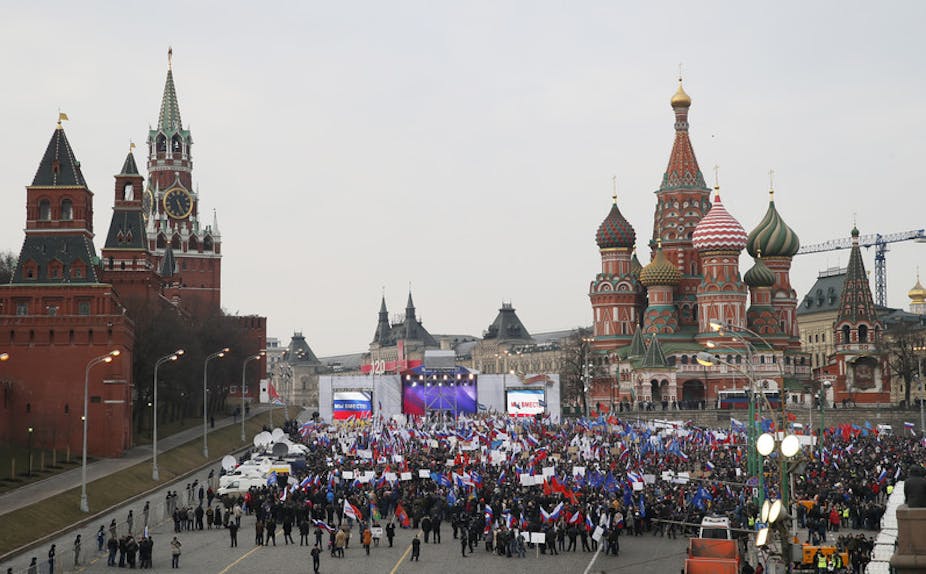The incursion into Ukraine by Russian forces, ostensibly in the name of “protecting” the Russian population of Crimea from harassment and violence at the hands of ethnic Ukrainians, is a classic case of a state sponsored “Big Lie”. Despite the manifest absurdity of the claim that Ukraine’s Russian population is being persecuted, Russia’s actions still raise serious questions about the role of diaspora politics in international affairs more broadly, and the obligations states have to their citizens who live elsewhere.
In various countries with immigrant populations, members of ethnic communities and political parties are often accused of “playing diaspora politics”. The concern is that members of diaspora communities and organisations illegitimately engage in lobbying to garner support for various “homeland issues” and that politicians accede to diaspora lobbying in the expectation of a payoff at election time. Diaspora politics are often cast in a negative light on the grounds that they import “old world” conflicts into a new country, and use it to distort that country’s “real” foreign policy interests. But the Russian authorities have lately added a new twist to how diaspora politics are played.
Though there are longstanding historical ties between Ukraine and Russia, the presence of substantial numbers of ethnic Russians and Russian speakers in Ukraine is, in part, a legacy of empire. The Soviet “Russification” of republics like Ukraine involved resettling ethnic Russians in order to dilute the influence and power of non-Russian ethnic groups. It also involved the promotion of the Russian language as the lingua franca of the Soviet Union; under the Soviets, many non-Russians learned Russian in order to take advantage of opportunities for social mobility.
It is important, therefore, to not conflate “ethnic Russians” with “Russian speakers” in Ukraine. Though there is overlap between the two categories, for some who eventually became Russian speakers, learning the language was not necessarily a reflection of their undying loyalty to Russia, nor some primordial attachment to a Russian identity.
The collapse of the Soviet Union meant that many of the former Russian republics were left with a stranded Russian imperial diaspora in their territory. Given their privileges under the former Soviet system, it is not surprising some ethnic Russians who are stranded in a former republic have not entirely severed their attachment to their ancestral homeland of Russia. At the same time, one wonders how much the apparent loyalty to Russia in eastern Ukraine in fact reflects a broader nostalgia for the old Soviet Union. For many people, life in independent Ukraine has been extraordinarily hard, and it is understandable that some individuals would like to return to what they see as the good old days, when bread was cheap even if the lines were long.
Home and away
Ukraine’s admittedly substantial Russian population (whether defined linguistically or ethnically), concentrated primarily in Crimea and in a number eastern oblasts, cannot justify the country’s being divided in two. Political loyalties and identities are not necessarily zero-sum. Many ethnic Russians in Ukraine no doubt have attachments and loyalties to Russia, but it cannot be assumed that those loyalties come at the expense of their attachment to Ukraine.

Russia’s claim that it is coming to the defence of Russians in Ukraine highlights the significance of victim narratives in diaspora politics. One of the defining features of a diaspora is its ability to preserve instances of historical victimisation in its collective memory, and in doing so to maintain group solidarity. President Putin and Foreign Minister Lavrov are adding another layer to diaspora victim narratives; their claims ought to be scrutinised with an eye to the role that such strategies play in political, and in this case military, mobilisation.
Any diaspora’s relationship with its ancestral homeland has an ebb and flow to it. The Ukrainian diaspora was euphoric when the Soviet Union collapsed and Ukraine declared independence in 1991. The opening of Ukraine to the west, and to the Ukrainian diaspora in particular, meant opportunities for first-generation emigrants to return, and for second- and third-generation members to connect with relatives they had never met or had only known through letters. Many diaspora Ukrainians also worked hard to raise money and start projects to support various civil society initiatives in the newly independent country.
The early euphoria eventually gave way to disenchantment, and led some within the diaspora to disengage with Ukraine. Though family visits were personally satisfying, broader initiatives to run civil society projects or start businesses often ended in frustration because of widespread corruption and graft, a problem that it still has. Disengagement also reflected a grudging recognition that there were limits to what the diaspora could do to help Ukraine, and that Ukraine’s problems had to be solved by Ukrainians.
But one of the unintended consequences of Russia’s actions over the past few days will be to reinvigorate the Ukrainian diaspora’s interest in and support of Ukraine from abroad – and to put to the test their ability to leverage their global presence for the benefit of those in the country itself.

